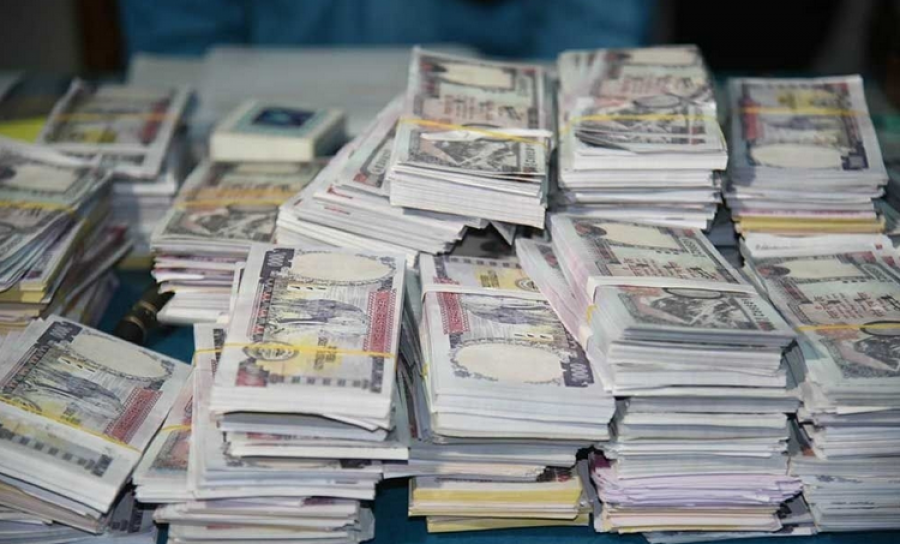Money
Anti-money laundering body to seek US data on Shah’s suspicious money
Finance Minister Janardan Sharma has been in question for his alleged attempts to release the money whose source even the central bank is trying to ascertain.
Prithvi Man Shrestha
The Department of Money Laundering Investigation is preparing to write to the United States’ Financial Crimes Enforcement Network, seeking details about the person who sent the money in the name of one Prithvi Bahadur Shah, an official of the department said.
As per the request of the US government agency, the Nepal Rastra Bank has frozen Rs400 million Shah had brought from the US, citing some suspicious activities.
Shah, a resident of Darna Rural Municipality-8 in Achham district, has been in the headlines in recent days over the money that came in his name from the US following reports that Finance Minister Janardan Sharma was attempting to facilitate the release of the money.
So much so, Sharma, who had been facing charges of failing to pay heed to the deteriorating economic situation of the country, had taken a drastic step of forming a probe committee leading to suspension of Nepal Rastra Bank Governor Maha Prasad Adhikari. Adhikari, however, was reinstated on April 19 after an interlocutory injunction by the Supreme Court, which ordered the government not to implement the decision to investigate Adhikari.
“We are drafting a letter to be sent to the Financial Crime Enforcement Network (FinCEN),” said Rishiram Pokharel, an information officer at the Department of Money Laundering Investigation (DMLI). “We will ask for details of the person who sent the money in the name of Shah to ascertain if it was black money or not.”
According to Pokharel, the letter will be sent through the Law Ministry, the competent authority for sending such letters, so that any response from the US agency could be used as evidence in the court of law.
Kantipur, the Post’s sister paper, first reported on April 7 that as per FinCEN’s request, the central bank had written to the DMLI to look into the source of the money brought in Shah’s name.
The Post has not received a response yet to a query sent to FincCen on April 13 regarding its letter to Nepal Rastra Bank, the central bank.
FinCEN is a US government agency under the Department of Treasury which collects and analyzes information about financial transactions in order to combat domestic and international money laundering, terrorist financing, and other financial crimes.
Stating that the money sent in the name of Shah was illegally earned, the US agency had requested Nepal’s Financial Information Unit under the central bank to freeze the amount and return it to the US, according to reports.
Pokharel said details have also been sought from the US agency through the Financial Information Unit of the central bank but information received through this agency will only be “a piece of information” for investigation purposes, which cannot be produced before the court as evidence.
The issue came into the spotlight after Post’s sister publication Kantipur broke the story.
After the government formed a probe committee on April 8 leading to the automatic suspension of central bank governor Maha Prasad Adhikari, the issue became more controversial amid accusations that Finance Minister Janardan Sharma took a proposal to the Cabinet to suspend Adhikari for his refusal to unfreeze Shah’s money despite Sharma’s instruction.
After the Supreme Court, responding to a petition by Adhikari, ordered the government not to implement the decision, it is Sharma who now faces a moral question.
In his petition, Adhikari blamed Finance Minister Sharma for verbally pressuring him to release the suspicious money, according to the petition he had filed at the Supreme Court.
Shah has long been making efforts to unfreeze the amount stuck in different Nepali banks. He has even claimed that the amount is just Rs 140 million, contrary to media reports that say Rs400 million.
Besides approaching Finance Minister Sharma, Shah had filed a petition at the Supreme Court on July 27 last year demanding that the court issue an interim order to release the money.
He had filed the petition on behalf of the World Export and Import Private Limited, in whose names the money was received, and other companies which Shah claims to own and operate.
Shah moved the Supreme Court after the DMLI, at the central bank’s FIU’s request, initiated a probe into the money deposited in Shah’s bank account.
As many as six petitions were registered at the Supreme Court demanding that the court stop the ongoing investigation into 15 bank accounts opened in the name of Shah, his kin, employees and different companies.
But the Supreme Court has already refused requests for an interim order to the central bank to release the money. The court on April 18 decided to send the sixth petition for a final hearing after refusing to issue an interim order demanded by Shah.
Although the issue was still under consideration in the Supreme Court, the DMLI on January 25 decided to unfreeze his bank accounts arguing that immediately available evidence did not establish Shah was involved in a crime related to money laundering, and wrote the banks concerned to unfreeze the money.
On January 31, the department had written to the central bank to facilitate the unfreezing process.
A senior official at the department, however, told the Post, on condition of anonymity, that it was a mistake to decide to unfreeze Shah’s bank accounts when the investigation was still underway.
“Political influence is apparent in this decision,” said the official.
Pokharel said that though the DMLI asked the banks to unfreeze Shah’s accounts, the investigation into the matter was never halted.
Certain amount has been brought to Nepal from the US stating that it will be used to serve tourists, according to Pokharel.
“We have sought details from relevant government agencies on whether Shah’s companies served tourists for foreign exchange earning as Shah has claimed,” said Pokhrel.




 21.12°C Kathmandu
21.12°C Kathmandu













